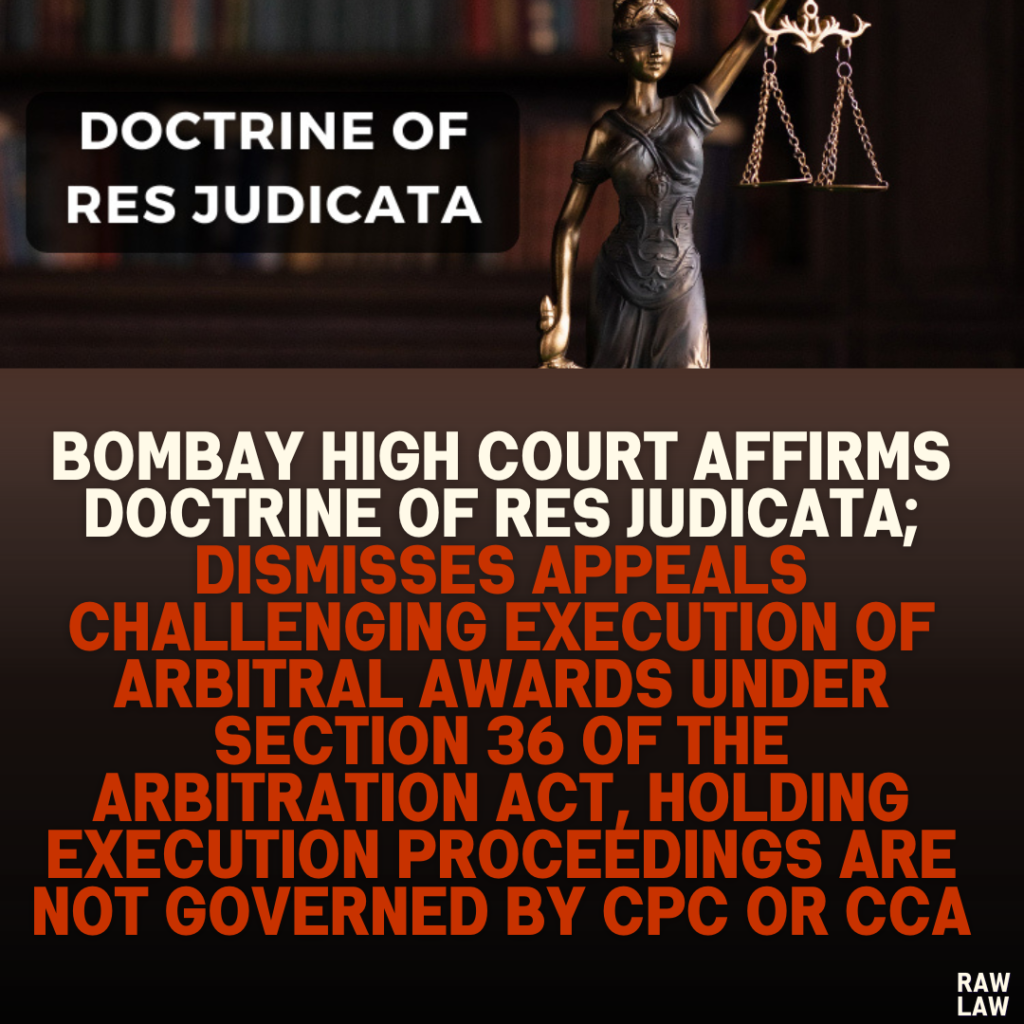Court’s Decision:
The Bombay High Court dismissed the appeals challenging orders in execution proceedings under Section 36 of the Arbitration and Conciliation Act, 1996 (ACA). The court held that:
- Maintainability of appeals in arbitration matters is determined strictly under the ACA, which is a self-contained code.
- Principles of res judicata applied, as the issue of maintainability had already been conclusively decided in earlier proceedings.
- Execution proceedings under the ACA are distinct from those under the Code of Civil Procedure (CPC) or the Commercial Courts Act (CCA) and cannot be treated as such for determining appealability.
Detailed Analysis of the Judgment:
1. Facts of the Case:
- Background:
- Disputes arose between the parties over agreements referred to arbitration in 2011.
- A consent award was made by the Arbitral Tribunal in July 2014, requiring the appellants to pay ₹178 crores with interest, which eventually escalated to ₹276.73 crores due to non-payment.
- The respondents sought to enforce the award under Section 36 of the ACA, leading to execution proceedings and interim orders (e.g., appointment of a Court Receiver).
- Appellants’ Contentions:
- They argued that the consent award and subsequent orders violated the provisions of the Foreign Exchange Management Act (FEMA).
- They challenged the execution proceedings and the maintainability of appeals under the ACA.
2. Issues for Determination:
- Does the earlier judgment of the court (dated August 9, 2019) bar the current appeals under the doctrine of res judicata?
- Can the execution proceedings under Section 36 of the ACA be treated as proceedings under the CPC or CCA for determining appealability?
3. Petitioner’s Arguments:
- The appellants argued that execution proceedings under the ACA are equivalent to execution under the CPC, as Section 36 of the ACA states that awards are enforceable “in the same manner as if it were a decree of the Court.”
- They contended that the appeal was maintainable under Section 13(1) of the CCA, which allows appeals from orders of commercial courts.
- The principle of res judicata did not apply, as the previous judgment dealt with interim orders, while the current appeals were against final orders.
4. Respondent’s Arguments:
- The respondents countered that:
- The execution proceedings are governed exclusively by the ACA, and appealability must be determined under Section 37 of the ACA, which provides a limited scope for appeals.
- Principles of res judicata applied, as the maintainability of appeals in similar execution proceedings was conclusively decided earlier.
- The appellants’ reliance on CPC or CCA provisions was misplaced, as the ACA is a self-contained code.
5. Court’s Analysis:
(i) Res Judicata: Finality of the Previous Judgment:
- The court explained the doctrine of res judicata, which prevents re-litigation of issues that have already been decided.
- The judgment of August 9, 2019, conclusively decided that appeals against orders in execution proceedings under Section 36 of the ACA are not maintainable. The court held:
- The earlier decision was made between the same parties, in the same proceedings, and dealt with the same issue of maintainability.
- The principle of res judicata applies even to different stages of the same case.
(ii) Execution Proceedings Under ACA vs. CPC:
- The court clarified that Section 36 of the ACA only provides that arbitral awards are enforceable “in the same manner as if they were a decree of the Court.” This does not mean that execution proceedings under the ACA are equivalent to execution under the CPC.
- The phrase “in the same manner as if it were a decree” creates a legal fiction solely for enforcement purposes and does not extend CPC provisions to arbitration-related appeals.
(iii) ACA as a Self-Contained Code:
- The court emphasized that the ACA is a special law with its own comprehensive framework, including limited provisions for appeal under Section 37. This excludes reliance on general laws like the CPC or CCA for determining appealability.
- The ACA’s objective is to ensure the speedy resolution of disputes. Allowing additional appeals would defeat this purpose.
(iv) Application of Precedents:
- Kandla Export Corporation v. OCI Corporation:
- This Supreme Court decision held that appealability in arbitration cases must be determined solely by the ACA, which excludes additional appeals under the CPC or CCA.
- Fuerst Day Lawson Ltd. v. Jindal Exports Ltd.:
- The court reiterated that the ACA is an exhaustive code, and appeals not explicitly provided for under Section 37 are barred.
6. Court’s Reasoning and Conclusion:
- Bar of Res Judicata:
- The earlier judgment conclusively decided the issue of appealability in similar execution proceedings. The court held that the present appeals were barred by the doctrine of res judicata.
- Maintainability Under ACA:
- Appeals against orders in execution proceedings under Section 36 of the ACA are not maintainable unless explicitly provided for in Section 37 of the ACA.
- Doctrine of Finality:
- The court emphasized the need for finality in litigation, particularly in arbitration matters, to promote efficiency and reduce delays.
- Dismissal of Appeals:
- The appeals were dismissed as not maintainable, affirming the principle that execution proceedings under the ACA are governed exclusively by the ACA.
7. Implications:
- This judgment reinforces the autonomy of the ACA as a self-contained code, excluding the application of general procedural laws like the CPC or CCA in arbitration-related appeals.
- It emphasizes the finality of decisions and bars re-litigation of issues already decided under the doctrine of res judicata.
- The decision promotes the expeditious enforcement of arbitral awards, aligning with the purpose of the ACA.




Pingback: Supreme Court: Temporary Appointments Made Without Regular Recruitment Process Do Not Confer Right to Reinstatement; Awards ₹5 Lakh Compensation for Premature Termination and Discriminatory Treatment - Raw Law
Pingback: Supreme Court Grants Conditional Bail to Former Minister in ₹151 Crore Recruitment Scam Case: "Ensures Expedited Trial and Strict Safeguards Against Witness Tampering and Public Office Misuse" - Raw Law